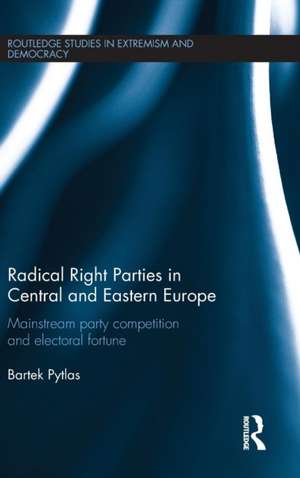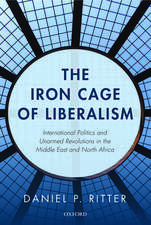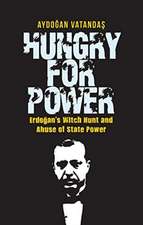Radical Right Parties in Central and Eastern Europe: Mainstream Party Competition and Electoral Fortune: Routledge Studies in Extremism and Democracy
Autor Bartek Pytlasen Limba Engleză Hardback – 21 oct 2015
This book is the first to provide a systematic theoretical framework and in-depth empirical research on the interaction between discursive influence, party competition and the electoral fortune of radical right parties in Central and Eastern Europe. It argues that in order to fully explain the impact of mainstream party strategies in this regard, it is vital to widen the analysis beyond competition over issues themselves, and towards their various legitimizing narratives and frame ownership. Up-to-date debates over policies of collective identity (minority, morality and nationalizing politics) in Hungary, Poland, and Slovakia serve as best cases to observe these under-researched phenomena. The analytical model is evaluated comparatively using original, primary data combined with election studies and expert surveys.
Advancing an innovative, fine-grained approach on the mechanisms and effects of party competition between radical right and mainstream parties, this book will be of interest to students and scholars researching the far right and European party politics, as well as political contestation and framing.
Din seria Routledge Studies in Extremism and Democracy
-
 Preț: 303.83 lei
Preț: 303.83 lei -
 Preț: 349.15 lei
Preț: 349.15 lei -
 Preț: 295.33 lei
Preț: 295.33 lei - 8%
 Preț: 389.08 lei
Preț: 389.08 lei -
 Preț: 198.93 lei
Preț: 198.93 lei -
 Preț: 284.51 lei
Preț: 284.51 lei -
 Preț: 290.39 lei
Preț: 290.39 lei -
 Preț: 301.40 lei
Preț: 301.40 lei -
 Preț: 329.75 lei
Preț: 329.75 lei -
 Preț: 303.14 lei
Preț: 303.14 lei -
 Preț: 348.24 lei
Preț: 348.24 lei -
 Preț: 296.39 lei
Preț: 296.39 lei -
 Preț: 317.58 lei
Preț: 317.58 lei -
 Preț: 386.79 lei
Preț: 386.79 lei - 28%
 Preț: 823.99 lei
Preț: 823.99 lei - 22%
 Preț: 325.96 lei
Preț: 325.96 lei - 18%
 Preț: 1061.57 lei
Preț: 1061.57 lei - 18%
 Preț: 701.25 lei
Preț: 701.25 lei - 18%
 Preț: 1058.65 lei
Preț: 1058.65 lei - 18%
 Preț: 1059.48 lei
Preț: 1059.48 lei -
 Preț: 414.32 lei
Preț: 414.32 lei -
 Preț: 415.67 lei
Preț: 415.67 lei - 18%
 Preț: 1062.62 lei
Preț: 1062.62 lei -
 Preț: 445.38 lei
Preț: 445.38 lei - 18%
 Preț: 1005.80 lei
Preț: 1005.80 lei - 18%
 Preț: 1115.33 lei
Preț: 1115.33 lei -
 Preț: 425.43 lei
Preț: 425.43 lei - 18%
 Preț: 1056.28 lei
Preț: 1056.28 lei - 18%
 Preț: 1109.99 lei
Preț: 1109.99 lei -
 Preț: 481.58 lei
Preț: 481.58 lei - 18%
 Preț: 1054.71 lei
Preț: 1054.71 lei - 18%
 Preț: 699.21 lei
Preț: 699.21 lei - 18%
 Preț: 1000.87 lei
Preț: 1000.87 lei - 26%
 Preț: 821.13 lei
Preț: 821.13 lei -
 Preț: 418.55 lei
Preț: 418.55 lei - 22%
 Preț: 323.72 lei
Preț: 323.72 lei -
 Preț: 375.12 lei
Preț: 375.12 lei - 18%
 Preț: 1181.63 lei
Preț: 1181.63 lei - 18%
 Preț: 1057.13 lei
Preț: 1057.13 lei -
 Preț: 486.42 lei
Preț: 486.42 lei - 18%
 Preț: 1000.45 lei
Preț: 1000.45 lei - 18%
 Preț: 1064.19 lei
Preț: 1064.19 lei -
 Preț: 488.12 lei
Preț: 488.12 lei
Preț: 1057.09 lei
Preț vechi: 1289.13 lei
-18% Nou
Puncte Express: 1586
Preț estimativ în valută:
202.27€ • 211.19$ • 167.41£
202.27€ • 211.19$ • 167.41£
Carte tipărită la comandă
Livrare economică 05-19 aprilie
Preluare comenzi: 021 569.72.76
Specificații
ISBN-13: 9781138889668
ISBN-10: 1138889660
Pagini: 260
Ilustrații: 34 black & white illustrations, 59 black & white tables, 34 black & white line drawings
Dimensiuni: 156 x 234 x 18 mm
Greutate: 0.52 kg
Ediția:1
Editura: Taylor & Francis
Colecția Routledge
Seria Routledge Studies in Extremism and Democracy
Locul publicării:Oxford, United Kingdom
ISBN-10: 1138889660
Pagini: 260
Ilustrații: 34 black & white illustrations, 59 black & white tables, 34 black & white line drawings
Dimensiuni: 156 x 234 x 18 mm
Greutate: 0.52 kg
Ediția:1
Editura: Taylor & Francis
Colecția Routledge
Seria Routledge Studies in Extremism and Democracy
Locul publicării:Oxford, United Kingdom
Public țintă
Postgraduate and UndergraduateCuprins
1. The Puzzle of Radical Right Electoral Fortune in Central and Eastern Europe: Introductory Remarks 2. The Radical Right and Their Mainstream Competitors in Central and Eastern Europe 3. Contest over Meaning: Theoretical Framework and Narrative Interaction Model of Radical Right Electoral Fortune 4. Bulwark of Christianity? Morality Debates in Poland 5. Defense against Hungarian Dominance? Minority Debates in Slovakia 6. A Second Trianon? Nemzetpolitika Debates in Hungary 7. Jobbik and Anti-Roma Minority Debates 8. Discursive Influence, Party Competition and Electoral Fortune: Comparative Results and Conclusions
Notă biografică
Bartek Pytlas received his doctoral degree in Comparative Political Science from European University Viadrina in Frankfurt (Oder). He is currently Lecturer at the Geschwister Scholl Institute of Political Science, Ludwig Maximilian University of Munich. His research interests include the electoral performance of radical right parties, comparative party competition, as well as transformation of societies and party systems in Europe.
Recenzii
"Radical Right Parties in Central and Eastern Europe: Mainstream Party Competition and Electoral Fortune" has received the Gero Erdmann Comparative Area Studies Award 2018 from Zeitschrift für Vergleichende Politikwissenschaft/Governance and Politics (ZfVP).
Descriere
This book is the first to provide a systematic theoretical framework and in-depth empirical research on the interaction between discursive influence, party competition and the electoral fortune of radical right parties in Central and Eastern Europe. It argues that in order to fully explain the impact of mainstream party strategies in this regard, it is vital to widen the analysis beyond competition over issues themselves, and towards their various legitimizing narratives and frame ownership. Up-to-date debates over policies of collective identity (minority, morality and nationalizing politics) in Hungary, Poland, and Slovakia serve as best cases to observe these under-researched phenomena. The analytical model is evaluated comparatively using original, primary data combined with election studies and expert surveys.













